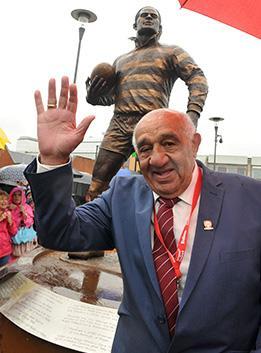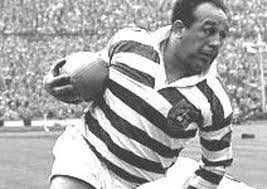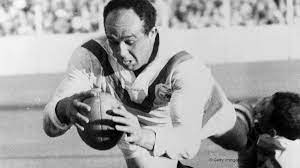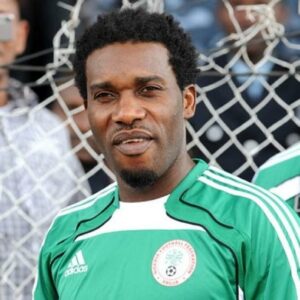William John Boston
Boston had an extremely successful rugby career playing wing and centre, lasting 15 years. His combination with right centre Eric Ashton has been held by many critics as one of the best combinations in history. Over this period he played 564 matches and scored an average of more than one try per game. He scored 571 tries in his career and remains second only to Brain Bevan as the greatest try-scorer the game has ever seen; often remembered as Wigan’s greatest and most popular player.
1934
Wales
His mother was Irish-Welsh and his father was from Sierra Leone
1953- First appearance in the ‘A’ team in front of Wigan’s crowd of 8,000 people
1954- Selected for Great Britain’s tour of Australia and New Zealand 1986
1954- Set a new try-scoring record for a tourist during Great Britain’s tour of Australia and New Zealand
1956-7- Scored 60 tries
1958-9- Scored over 54 tries
1988 – One of the first nine players to be inducted into the Rugby League Hall of Fame. He received an MBE and Central Park Wigan named a stand after him
2009 -The East Stand at the DW Stadium Wigan was officially renamed after Billy Boston
2020 December- It was announced he would be honoured with a statue in Cardiff Bay
-Billy Boston was born in 1934 to his mother Nellie, who was Cardiff-Irish and his father John, who was a merchant seaman from Sierra Leone. Boston grew up alongside 10 siblings in Tiger Bay docklands in Cardiff. He attended South Church Street School in Butetown.
-After Billy left school, he had decided that his ambition was to play for Cardiff at the Arms Park.
– He started his rugby career at CIACS, the multi-national Cardiff International Athletic Club. He also represented the Cardiff Schoolboys team in the late 1940s and represented Wales in three boys clubs’ internationals and in three more at Youth level.
-Boston was gaining great attention for his talent and had two opportunities from Neath RFC in 1950 and Pontypridd RFC in 1952, but he never grabbed the attention of Cardiff RFC and suspected it was because of the colour of his skin.
-Boston moved to the North of England to do his National Service with the Royal Signals where he gained great attention and was scouted by a number of Rugby League clubs.
1953:
-On Friday 13 March 1953, Boston was made an offer of £1,000 by Joe Taylor and Billy Gore, Chairman and Vice Chairman of Wigan Rugby Team. Boston and his mum finally settled on £3,000. Boston was very disheartened as it blurred his dream of playing for Cardiff and Wales.
November 21st, 1953:
Boston made his first appearance in the ‘A’ team in front of Wigan’s crowd of 8,000 people.
1954:
-Boston was so good that after only a few matches with Wigan he was selected for Great Britain’s tour to Australia and New Zealand. Boston had a remarkable debut game against Australia, where he scored two tries, setting a new try-scoring record for a tourist.
1956-9:
-From 1956-7 he scored 60 tries and in 1958-9 he scored over 54. These games like Wigan vs Workington Town and Hull in the Challenge Cup Final at Wembley Stadium attracted large crowds of up to 89,016.
1960:
He scored two decisive tries in a memorable Championship Final win over Wakefield Trinity.
1962:
He was selected for another Great Britain tour of Australasia where he scored 22 tries.
-In 1986, he was appointed an MBE for his services to the game of rugby league and Central Park named a stand after Billy Boston too.
-In 1988 he was one of the first nine players to be inducted into the Rugby League Hall of Fame.
-Wigan also raised £90,000 to honour Boston with a statue
-The East Stand at the DW Stadium was officially renamed after Billy Boston in 2009
-In December 2020 Boston finally attained his goal of making his stamp on Cardiff rugby as it was announced he would be honoured with a statue in Cardiff Bay.
-Billy and his wife Joan Boston and had a daughter called Angela and three grandchildren, Ross, Sean and Zoe.
Peter Jackson, ‘Billy Boston: Welsh rugby legend who never played at the Arms Park’, BBC Sport Wales (BBC, revised 5 December 2016) [11 February 2022]
Gary Shaw, ‘Through adversity: the fight for rugby league in the RAF; Soldiers’ League: the story of army rugby league’, Sport in History, 36.4 (2016) 529-532
Robert Gates, Billy Boston: Rugby League Footballer (London: London League Publications Ltd, 2009)




